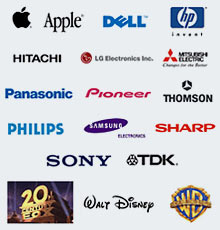Andrew Li
Object From the Future Research Questions Driving forces
Object From the Future
Blu-Ray Disc
Blu-ray, also known as Blu-ray Disc (BD), is the name of a next-generation optical disc format jointly developed by the Blu-ray Disc Association (BDA), a group of the world's leading consumer electronics, personal computer and media manufacturers (including Apple, Dell, Hitachi, HP, JVC, LG, Mitsubishi, Panasonic, Pioneer, Philips, Samsung, Sharp, Sony, TDK and Thomson). The format was developed to enable recording, rewriting and playback of high-definition video (HD), as well as storing large amounts of data. The format offers more than five times the storage capacity of traditional DVDs and can hold up to 25GB on a single-layer disc and 50GB on a dual-layer disc. This extra capacity combined with the use of advanced video and audio codecs will offer consumers an unprecedented HD experience.
The key technologies of Blu-ray is the blue-violet laser that is used to write the data to the disc. This blue laser has a much shorter wavelength than the current red laser DVD system, which makes it possible to read and write smaller pits, as a result, these discs can hold up to 25 GB of data on a single sided single layer 12cm disc.
Strongest competitor
The HD-DVD (High Definition DVD) is currently the stongest competitor of Blu-ray Disk. It have low production cost as advantage.
which format will become the next standard for movie and data storage?
BD will be the next generation for movie and data storage because:
- more in capacity. Can store more data on a single disk
- many and whealty companies supporting the blu-ray
- Longer lifespan in use by higher capacity.
- more innovative, new technologie. More posibility for development.
Driving forces
- Name: More possibility by faster internet connection.
- What: As internet connection speed keeps increasing, people want to share/download music, movie or information with/from others. Therefore WebLogs, P2P networks, bittorrents and different file sharing system arise.
- Enablers: Internet users with broadband/DSL is growing rapidly. And the speed also increasing.
DSL users in 2004 85,300,000. - Inhibitors: Internet too complicated to use for people of older generation.
- Paradigms: Internet is becoming more usefull. young and old people can use it. Its becomes something that every household must have.
- Name: Freedom of speaking.
- What: As new technology develops, more and more people have access to the internet at low cost. And so more and more people wants/needs to express his meaning/thought. And some people wants Freedom on expression, especially in China where use internet is restricted. But in a community using blog they can talk about anything, including politics and sex. Since China have the second highest number of internet users on the world, the influence will be great.
- Enablers: Use of Blog is free.
- Inhibitors: Not sure what the chinees government will do in the future.
- Paradigms: Change in lifestyle, political view and the way of thinking.
- Resource: CNN TV news.
article: The 'blog' revolution sweeps across China - Name: New service opportunity.
- What: Companies try differentiate from his competitors by prividing better services. This triggers the trend of using RSS by commercial websites in the beginning. Or the web-service like amazone, ebay, MyYahoo, Gmail ... are provided.
- Enablers: RSS is very simple to use, as its name said: RSS = Really Simple Syndication.
- Inhibitors: ---
- Paradigms: ---
- Web Resources: For more information about RSS.


